希特勒的崛起 英文
德国的纳粹党和希特勒的崛起
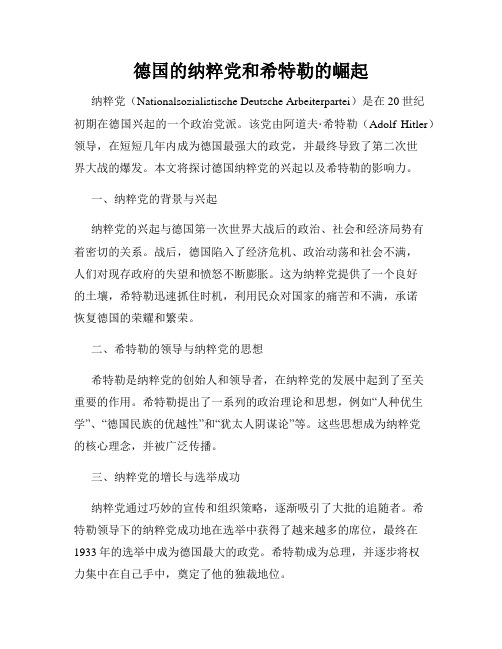
德国的纳粹党和希特勒的崛起纳粹党(Nationalsozialistische Deutsche Arbeiterpartei)是在20世纪初期在德国兴起的一个政治党派。
该党由阿道夫·希特勒(Adolf Hitler)领导,在短短几年内成为德国最强大的政党,并最终导致了第二次世界大战的爆发。
本文将探讨德国纳粹党的兴起以及希特勒的影响力。
一、纳粹党的背景与兴起纳粹党的兴起与德国第一次世界大战后的政治、社会和经济局势有着密切的关系。
战后,德国陷入了经济危机、政治动荡和社会不满,人们对现存政府的失望和愤怒不断膨胀。
这为纳粹党提供了一个良好的土壤,希特勒迅速抓住时机,利用民众对国家的痛苦和不满,承诺恢复德国的荣耀和繁荣。
二、希特勒的领导与纳粹党的思想希特勒是纳粹党的创始人和领导者,在纳粹党的发展中起到了至关重要的作用。
希特勒提出了一系列的政治理论和思想,例如“人种优生学”、“德国民族的优越性”和“犹太人阴谋论”等。
这些思想成为纳粹党的核心理念,并被广泛传播。
三、纳粹党的增长与选举成功纳粹党通过巧妙的宣传和组织策略,逐渐吸引了大批的追随者。
希特勒领导下的纳粹党成功地在选举中获得了越来越多的席位,最终在1933年的选举中成为德国最大的政党。
希特勒成为总理,并逐步将权力集中在自己手中,奠定了他的独裁地位。
四、希特勒的统治与纳粹德国希特勒利用纳粹党的力量,建立了一个极权主义的国家,被称为纳粹德国。
他通过推行各种政策和法律,加强了国家控制和国民意识形态的一体化。
希特勒对犹太人的种族迫害和侵略行动导致了数百万人的死亡和战争的爆发。
五、纳粹党的衰落与战争的结束纳粹党虽然取得了一定的成功,但随着战争的进行,德国面临日益严重的困境。
1945年,纳粹德国最终战败,希特勒自杀,纳粹党被解散。
六、纳粹党和希特勒的遗产纳粹党和希特勒的兴起与崛起对德国和世界都造成了深远的影响。
第二次世界大战带来了巨大的破坏和人员伤亡,对德国和全球的经济和政治秩序产生了长期的冲击。
希特勒的崛起与失败
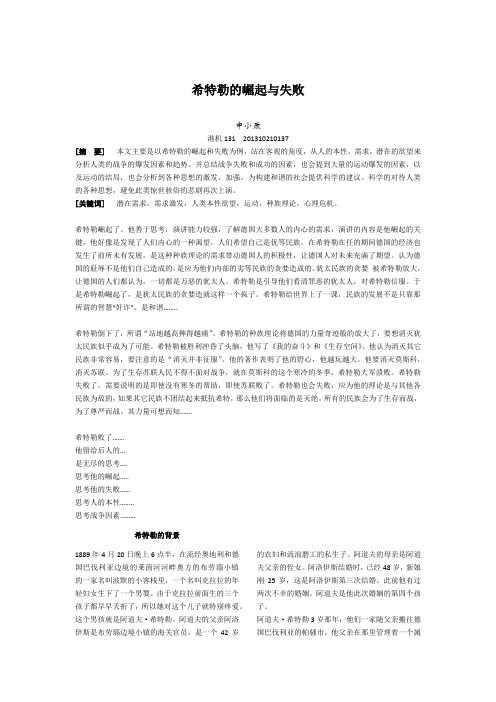
希特勒的崛起与失败申小康港机131 201310210137[摘要]本文主要是以希特勒的崛起和失败为例,站在客观的角度,从人的本性,需求,潜在的欲望来分析人类的战争的爆发因素和趋势。
并总结战争失败和成功的因素,也会提到大量的运动爆发的因素,以及运动的结局,也会分析到各种思想的激发,加强。
为构建和谐的社会提供科学的建议。
科学的对待人类的各种思想,避免此类惊世骇俗的悲剧再次上演。
[关键词]潜在需求,需求激发,人类本性欲望,运动,种族理论,心理危机。
希特勒崛起了。
他善于思考,演讲能力较强,了解德国大多数人的内心的需求,演讲的内容是他崛起的关键,他好像是发现了人们内心的一种渴望,人们希望自己是优等民族。
在希特勒在任的期间德国的经济也发生了前所未有发展。
是这种种族理论的需求带动德国人的积极性,让德国人对未来充满了期望。
认为德国的耻辱不是他们自己造成的,是应为他们内部的劣等民族的贪婪造成的。
犹太民族的贪婪被希特勒放大,让德国的人们都认为,一切都是万恶的犹太人。
希特勒是引导他们看清罪恶的犹太人,对希特勒信服。
于是希特勒崛起了,是犹太民族的贪婪造就这样一个疯子。
希特勒给世界上了一课,民族的发展不是只靠那所谓的智慧“奸诈”。
是和谐……..希特勒倒下了,所谓“站地越高摔得越痛”。
希特勒的种族理论将德国的力量奇迹般的放大了,要想消灭犹太民族似乎成为了可能。
希特勒被胜利冲昏了头脑,他写了《我的奋斗》和《生存空间》。
他认为消灭其它民族非常容易,要注意的是“消灭并非征服”。
他的著作表明了他的野心,他越玩越大。
他要消灭莫斯科,消灭苏联。
为了生存苏联人民不得不面对战争,就在莫斯科的这个寒冷的冬季,希特勒大军溃败。
希特勒失败了。
需要说明的是即使没有寒冬的帮助,即使苏联败了。
希特勒也会失败,应为他的理论是与其他各民族为敌的,如果其它民族不团结起来抵抗希特,那么他们将面临的是灭绝。
所有的民族会为了生存而战,为了尊严而战。
其力量可想而知…….希特勒败了…….他留给后人的…是无尽的思考….思考他的崛起…..思考他的失败……思考人的本性……..思考战争因素………希特勒的背景1889年4月20日晚上6点半,在流经奥地利和德国巴伐利亚边境的莱茵河河畔奥方的布劳瑙小镇的一家名叫波默的小客栈里,一个名叫克拉拉的年轻妇女生下了一个男婴。
希特勒的英文简介
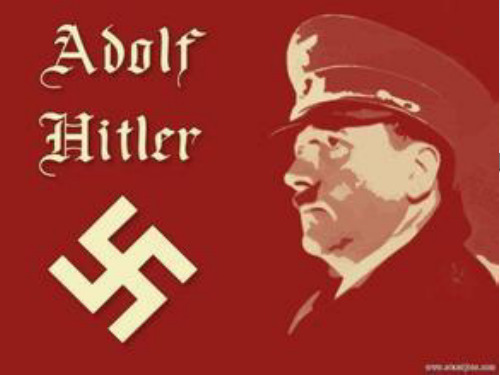
He
quickly took dictatorial powers and began to institute anti-Jewish laws. He also began the process of German militarisation and territorial expansion that would eventually lead to World War Two . He allied with Italy and later Japan to create the Axis(轴心国).
Early years World War I At the outbreak of World War I, Hitler volunteered to serve in the Bavarian(巴伐利亚, 德国) army as an Austrian citizen.
During
and
father
worked in the customs bureau his mother was a
housewife. Hitler had three
siblings(哥哥姐姐) but they all died in infancy(幼年)
希特勒英文简介(HitlerEnglishIntroduction)

希特勒英文简介(Hitler English Introduction)个人简介英文姓名:阿道夫·希特勒中文名称:阿道夫。
希特勒性别:男出生日期:1889年4月20日出生地:Braunau的奥地利小镇(靠近德国边境)死亡日期:1945年4月30日死亡地点:柏林阿道夫·希特勒(帮助·信息)(1889年4月20日–1945年4月30日)从1933德国总理和“Fü给”(领袖)德国从1934直到他的死亡。
他是德国国家社会主义工人党的领袖(国家社会主义德意志工人党或纳粹党),更好地称为纳粹党。
独特的身世希特勒的父母都来自贫农家庭。
他的父亲Alois Hitler,一个女仆的私生子,是一个聪明、有野心的人,后来成为一名高级海关官员。
Klara Hitler是alois'third妻子。
阿洛伊斯比克拉拉年长二十三岁,已经有了两个孩子从他以前的婚姻。
Klara和阿洛伊斯有五个孩子,但只有阿道夫和一个妹妹,保拉,存活到成年。
发展过程1.student2.soldier3.do在小学4.stop试图成为第一研究最喜欢的游戏艺术5.move维也纳6.receive父亲的公务员养老7.volunteer FR德国军队在慕尼黑9.rebuild8.be纳粹aarty其他士兵逮捕10.establish第三帝国11.base专制mand他的军队去打仗13.die希特勒与中日关系的两面性希特勒关于中国和日本1的想法。
鄙视日本看好中国他看着日本。
但是,他看好中国。
2。
喜欢中国茶叶希特勒喜欢喝中国茶。
3。
希特勒不准报道南京大屠杀希特勒不允许人们报告南京大屠杀。
阿道夫。
希特勒已经不再是之一个人,他泛指了一个时代的血型与残暴,扭曲与狭隘。
他是法西斯的象征,而他背后,是第二次世界大战的开始与终结。
阿道夫·希特勒不再是一个人,他是指血液和残酷的时代,失真和狭窄。
他是法西斯的象征,在他身后,是第二次世界大战和结束的开始。
描写希特勒英语作文
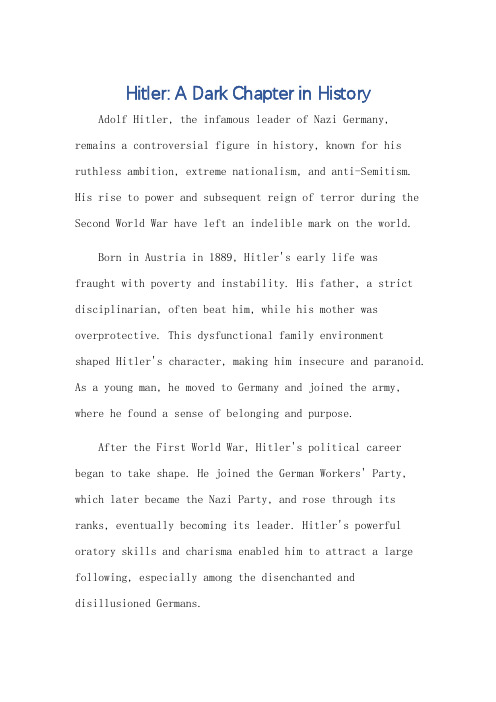
Hitler: A Dark Chapter in HistoryAdolf Hitler, the infamous leader of Nazi Germany, remains a controversial figure in history, known for his ruthless ambition, extreme nationalism, and anti-Semitism. His rise to power and subsequent reign of terror during the Second World War have left an indelible mark on the world.Born in Austria in 1889, Hitler's early life wasfraught with poverty and instability. His father, a strict disciplinarian, often beat him, while his mother was overprotective. This dysfunctional family environment shaped Hitler's character, making him insecure and paranoid. As a young man, he moved to Germany and joined the army, where he found a sense of belonging and purpose.After the First World War, Hitler's political career began to take shape. He joined the German Workers' Party, which later became the Nazi Party, and rose through its ranks, eventually becoming its leader. Hitler's powerful oratory skills and charisma enabled him to attract a large following, especially among the disenchanted anddisillusioned Germans.Hitler's political philosophy was based on extreme nationalism, anti-Semitism, and social Darwinism. He believed that the German race was superior to all others and that the Jews were a threat to German society. He advocated for the expansion of German territory and the elimination of all perceived threats to the Reich.Under Hitler's leadership, the Nazi Party gained significant political power in Germany. In 1933, Hitler became the Chancellor of Germany and quickly consolidated his grip on power. He abolished democratic institutions, established a totalitarian state, and began to implement his radical agenda.Hitler's reign of terror was marked by widespread discrimination, persecution, and violence. Jews, homosexuals, political opponents, and others were targeted for elimination. Concentration camps were established, and millions of people were killed or enslaved. Hitler's ambitions led him to invade numerous countries, including France, Belgium, the Netherlands, and Russia, in a bid for world domination.The Allied Powers, led by the United States, Great Britain, and Russia, eventually defeated Germany in the Second World War. Hitler's reign came to an end in April 1945, when he committed suicide in his bunker in Berlin, rather than face capture and trial.The legacy of Hitler and the Nazi era is complex and multifaceted. While Hitler's actions and ideologies were barbaric and reprehensible, they also serve as a stark reminder of the dangers of unchecked ambition, intolerance, and hatred. Hitler's rise to power and the atrocities committed under his leadership are a cautionary tale forall nations and generations.**希特勒:历史中的黑暗篇章**阿道夫·希特勒,纳粹德国的臭名昭著的领导人,以他冷酷无情的野心、极端民族主义和反犹太主义而臭名昭著,在历史中是一个充满争议的人物。
历史人物希特勒英文介绍ppt精选课件
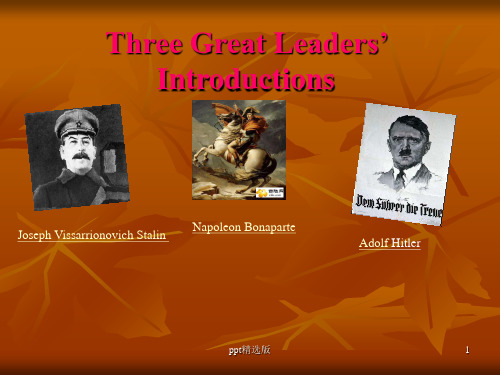
兵败俄国
In May 1812, napoleon and exercise in 12 languages of the 570000 expedition to the Russian army. Finally because the weather was cold, and the Russian used scorched earth policy, leading to defeat Russia.
翻译:斯大林1900年开始参 加地下政治活动,在高加索 一些工业中心组织罢工、示 威。1903年俄国社会民主工 党分化为孟什维克派和布尔 什维克两派后,他参加了布 尔什维克派 。
He helped Lenin organization and leadership to the 1917 October socialist revolution.. 1922 to October 1952 for the party central committee general secretary for elected.
Hitler: he gave the world and the world of the broad masses of the people with devastating disaster.
Stalin: Stalin's leadership of the country's socialist construction, and make the Soviet economy growing strength; Guide the Soviet union made of German fascism, consolidate the world peace.
Apocalypse:RiseofHitler 二次大战启示录:希特勒崛起
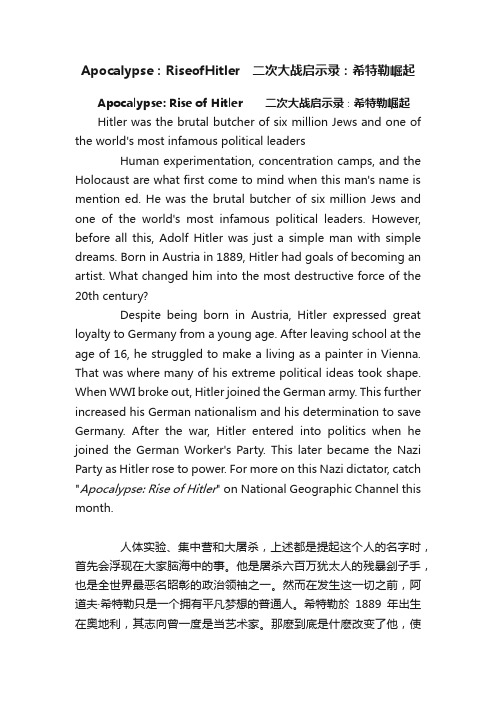
Apocalypse:RiseofHitler 二次大战启示录:希特勒崛起Apocalypse: Rise of Hitler二次大战启示录∶希特勒崛起Hitler was the brutal butcher of six million Jews and one of the world's most infamous political leadersHuman experimentation, concentration camps, and the Holocaust are what first come to mind when this man's name is mention ed. He was the brutal butcher of six million Jews and one of the world's most infamous political leaders. However, before all this, Adolf Hitler was just a simple man with simple dreams. Born in Austria in 1889, Hitler had goals of becoming an artist. What changed him into the most destructive force of the 20th century?Despite being born in Austria, Hitler expressed great loyalty to Germany from a young age. After leaving school at the age of 16, he struggled to make a living as a painter in Vienna. That was where many of his extreme political ideas took shape. When WWI broke out, Hitler joined the German army. This further increased his German nationalism and his determination to save Germany. After the war, Hitler entered into politics when he joined the German Worker's Party. This later became the Nazi Party as Hitler rose to power. For more on this Nazi dictator, catch "Apocalypse: Rise of Hitler" on National Geographic Channel this month.人体实验、集中营和大屠杀,上述都是提起这个人的名字时,首先会浮现在大家脑海中的事。
希特勒的崛起【英文】
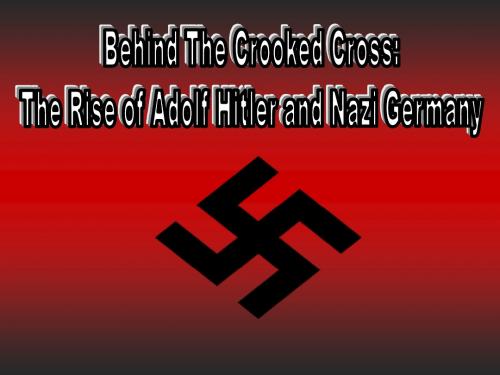
KLARA and ALOIS:
THE PARENTS OH
LEFT: Hitler at age 13
BELOW: Hitler, part of a church choir group
Adolf was an intelligent child, but a poorly performing student, both of Adolf’s parents died when he was a teenager, leaving him with a modest inheritance; Adolf sought to become an artist
GERMAN COMPOSER RICHARD WAGNER
FIRST EXPOSURE TO POLITICS
GEORG VON SCHOENERER
KARL LUEGER
Galician Jews are present in Vienna. As with much of Europe, there are anti-Semitic feelings in Vienna (it was Adolf’s first exposure to antiSemitism). The politics of Georg von Schoenerer (an anti-Semite) and Vienna’s mayor, Karl Lueger (who said the public would do without freedoms for security), would have an influence on young Hitler.
ADOLF HITLER
ESSENTIAL QUESTION
- 1、下载文档前请自行甄别文档内容的完整性,平台不提供额外的编辑、内容补充、找答案等附加服务。
- 2、"仅部分预览"的文档,不可在线预览部分如存在完整性等问题,可反馈申请退款(可完整预览的文档不适用该条件!)。
- 3、如文档侵犯您的权益,请联系客服反馈,我们会尽快为您处理(人工客服工作时间:9:00-18:30)。
The Weimar Republic
ຫໍສະໝຸດ 1919 – A constitution is drafted in the city of Weimar to create a democratic government to run Germany. It set up a Parliament, led by a chancellor, which is another term for a prime minister. It was weak because like Britain and France, it had many small parties, forcing them to establish a coalition government. The government was blamed by all Germans for agreeing to the Treaty of Versailles. When the Republic was no longer able to pay its war debt, France and Belgium invaded and took over the Ruhr Valley.
Mein Kampf
Reflects Hitler obsessions of extreme nationalism, racism, and anti-Semitism. Germans were a Superior “master race” of Aryans, or light-skinned Europeans, whose greatest enemies were the Jews. Echoed a familiar right-wing theme, that Germany had not lost the war, but had been betrayed by a conspiracy of Marxists, Jews, corrupt politicians, and business leaders. Urged German’s everywhere to unite into one great nation. Believe Germany needed to increase it’s living space or “Lebensraum” for the people. Slavs, Pols, and other inferior races needed to bow to Aryan needs. Germany needed a strong leader or “Fuhrer.”
This added to Germany’s humiliation.
Germans wanted a strong leader, like Otto von Bismarck had been.
When the Great Depression hit, faith in the government was gone.
Hitler and the Nazi Party
Hitler began to despise the Weimar government, believing it was weak and ineffectual. He joins the Nazi Party in 1919, and quickly rises to the top. In 1923, Hitler tries to forcibly seize power in Munich, Germany, but fails, and is arrested and sentenced to five years in prison. While in prison, Hitler writes his book “Mein Kampf” or “My Struggle”, which would soon become the basic book of Nazi goals, and ideology. Hitler leaves prison after less than a year. He realized that power was easiest to keep and hold when it came legally. He used the Great Depression, and ineffectiveness of the Weimar government to rally workers, small-town Germans, and business leaders to his cause
Adolf Hitler
The Rise to Power
The Early Years
Hitler was born in Austria in 1889. When he was 18, he moved to Vienna, the capital of the multi-ethnic Hapsburg Empire. hoping to enter art school, but was rejected. While in Vienna, Hitler was poor. He had odd jobs, but was forced to live in hostels to get by. Here he began to form his fanatical antiSemitism. Germans were only one of many ethnic groups in Austria. Yet they felt superior to Jews, Serbs, Poles, Czechs, and others. He moved to Germany, and fought as a German soldier in WW I, earning two medals for his service. After the war, Hitler remained in the Army, and was assigned to keep tabs on political groups. One of these groups was the National Socialist German Workers Party, or Nazi Party.
